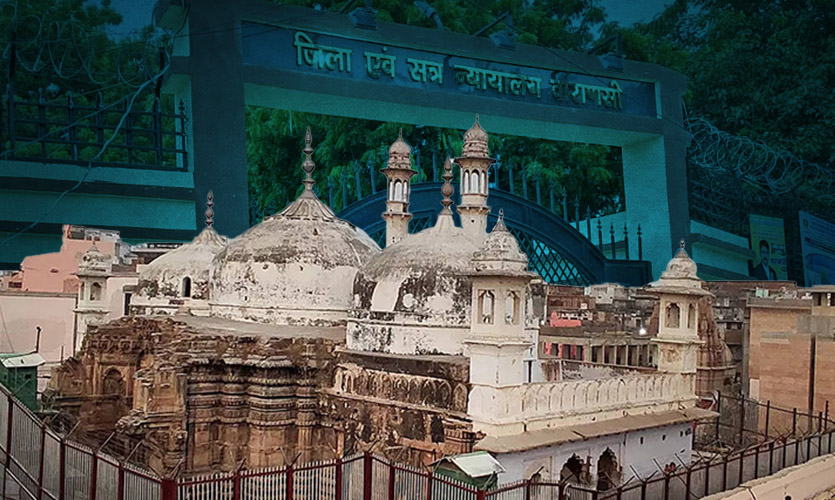On Monday, a bench of district Judge AK Vishvesh ruled that it will continue hearing the Gyanvapi mosque-Shringar Gauri dispute case, allowing the petition brought by five Hindu women who seek the right to pray to the alleged ‘shivling’ inside the mosque, located adjacent to the Kashi Vishwanath temple. The district court in Varanasi also dismissed the Anjuman Intezamia Committee’s petition disputing the Hindu worshippers’ request for permission to pray inside the mosque.
In his order, earlier today, Judge AK Vishvesh said that the lawsuit is maintainable, and that the case will continue to be heard. The Anjuman Committee, which represents the Muslim side, is set to move the High Court regarding the same. Advocate Man Bahadur Singh, one of the lawyers who represents one of the Hindu women plaintiffs, informed that the Muslim side’s request had been refused.
Prior to the verdict, an alert had been issued in all critical regions of Uttar Pradesh, and patrols were scheduled. “Peace being ensured. Religious heads have issued statements asking for peace to be maintained,” said ADG (Law and Order) Prashant Kumar. Prohibitory orders under section 144 of the CrPC were issued in Varanasi a day ago, and extra police troops were deployed in areas populated by members of both communities.
In May, the Supreme Court transferred the matter from a lower court to the Varanasi district judge’s court. “Keeping the complexity and sensitivity of the matter in view, the civil suit before the civil judge in Varanasi shall be heard before a senior and experienced judicial officer of the UP judicial service,” the court had said. A month before the apex court’s intervention in the case, the Varanasi Civil Court had ordered the filming inside the Gyanvapi mosque, based on a petition by Hindu women who claim that there are idols of Hindu gods and goddesses in the mosque.
According to Anjuman Committee petitioners, the filming violates the Places of Worship Act,1991, which preserves the religious status of any house of worship as of August 15, 1947. A report on the filming at the Gyanvapi mosque was subsequently sealed and delivered to the Varanasi court, but the Hindu petitioners controversially leaked details mere hours later. According to the report, a ‘shivling’ was discovered in a pond within the mosque compound that was used for “wazoo”, used by Muslims to wash their face, hands and feet before prayers. The judge hearing the case at the time ordered the pond to be sealed. The Gyanvapi mosque committee had contested the filming within the centuries-old mosque, at the Supreme Court.
“Such petitions and sealing of mosques will lead to public mischief and communal disharmony… will affect mosques across the country,” objected the mosque committee.
In front of the Varanasi district judge’s court, the committee made identical arguments, while attorneys for the Hindu petitioners contended that the law did not prohibit their case, and that they could establish in court that the mosque’s premises were really a temple on the day of independence. Earlier, the Hindu side had said that it will seek a survey by the Archaeological Survey of India (ASI), for carbon-dating.
The police have deployed forces in areas of the city with a mixed population, and patrolling is ongoing to ensure that no law and order situation arises as a result of the hearing. “We are trying our best that no law and order situation arises,” stated Commissioner AS Ganesh. Varanasi Assistant Commissioner Santosh Kumar Singh stated that around 2000 police officers have been deployed, and that all required arrangements have been made to preserve peace and order.
“Peace Committee meetings have been held several times and police is on alert. along with this, we have also talked to the religious leaders and an appeal has been made to maintain peace,” stated Singh.
In May, the court had authorised the inspection, survey, and filming of the mosque complex in order to gather evidence concerning the suspected presence of Hindu deity idols within the mosque, which is close to the Kashi Vishwanath Temple. It had further stated that no restrictions should be put on Muslims who visit the mosque to perform namaz or other religious observances.
The next hearing has been scheduled for September 22.










